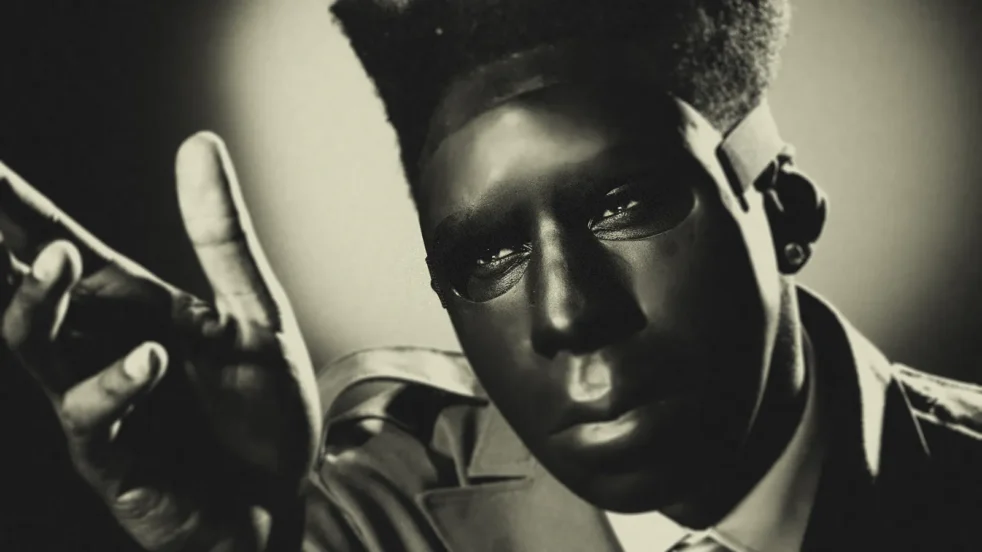The eighth studio album titled “CHROMAKOPIA” by Tyler Okonma, who goes by the stage name Tyler, the Creator, released on Oct. 28. Tyler dons the persona of St. Chroma while delving into relationships as a celebrity, the impact of his childhood and the juxtaposition between the good and bad that come with success — all narrated by Tyler’s mother, Bonita Smith.
The Los Angeles native has been active in the music industry since 2007 as a primary founder of the alternative hip-hop group Odd Future Wolf Gang Kill Them All, colloquially known as Odd Future. The collective released their debut mixtape in 2008 but on Dec. 29, 2009, Tyler released his first solo album “Bastard” under the moniker Tyler, the Creator. Each album released under this name follows a story with “Cherry Bomb” as the sole exception. Early in Tyler’s career, his songs featured provocative yet incredibly creative lyricism, accompanied by experimental production.
His career diverged with his critically received 2017 release “Flower Boy,” which lost to Kendrick Lamar’s Pulitzer Prize-winning “DAMN.” for the Best Rap Album at the 60th Annual Grammy Awards ceremony. “Flower Boy” leaned into Tyler’s personal life, followed in 2019 by “IGOR,” which won the Grammy for Best Rap Album in 2020. As Tyler slips on the mask of St. Chroma for “CHROMAKOPIA,” he paradoxically unveils his life before the listener.
Tyler’s mother speaks the opening lines to this album in “St. Chroma,” the first track: “You are the light / It’s not on you, it’s in you / Don’t you ever in your mother****ng life dim your light for nobody.” Although a freeing sentiment, Tyler intentionally sets the album’s framework with this introduction as he aims to release all expectations and be his truest self. Daniel Caesar makes his first appearance on the album with vocals scattered throughout the song, asking, “Can you feel the light? / Can you feel that fire?” to reiterate the metaphor of Tyler’s ambition and creativity as being light.
An abundance of capital in popularity and cash is the cornerstone of Tyler’s arrogance on the second track, “Rah Tah Tah.” The lyrics epitomize the ego he has developed, claiming he is “The biggest out the city after Kenny, that’s a fact now,” referencing the widely regarded current best artist from the Los Angeles area, Kendrick Lamar.
Alongside celebrity status comes paranoia. “Noid” showcases the unease felt by Tyler as he simply attempts to live. The world is no stranger to the development of parasocial relationships between entitled fans and their icons and Tyler laces “Noid” with the anxiety surrounding the lack of personal and professional boundaries.
The middle tracks of the album embody Tyler’s capacity to convey such complex emotions surrounding love through art. “Darling I” features Teezo Touchdown complimenting Tyler’s inability to commit and desire to explore love with different people, whereas “Hey Jane” utilizes a back-and-forth written letter structure to detail the stress of an unexpected pregnancy between Tyler and an anonymous partner. This fear of love is gone as Childish Gambino joins Tyler on “Judge Judy,” where Tyler falls for the titular Judy. After their casual relationship goes silent Tyler accepts the beauty of loss — until he receives a letter from Judy explaining her disappearance.
Tyler presents his personal conflicts with his identity in “I Killed You,” “Take Your Mask Off” and “Thought I Was Dead.” Tyler is a great example of intersectionality, the overlapping of one’s social and political identity within a society. Intersectionality often leads to a complicated relationship with one’s self, which Tyler discusses in “I Killed You” using the treatment of natural black hair, and the practice of masking to find a sense of belonging in social situations, combated in “Take Your Mask Off.” On the contrary, Tyler rejects stealing others’ culture in “Thought I Was Dead,” instead choosing to embrace his identity and value himself above those who are not true to themselves.
Relentless self-love is the major theme of “Sticky” and “Balloon.” These two anthems combine humor with adamant confidence as GloRilla, Sexyy Red and Lil Wayne join Tyler on “Sticky,” and Doechii features on “Balloon” with incredibly rhythmic verses. Tyler’s production compounded with their star-studded nature creates two of the best tracks on “CHROMAKOPIA.”
The final theme of the album focuses on Tyler’s relationship with family. The tenth track, “Tomorrow,” highlights his mother’s pleas for Tyler to pause his musical career to start his own family and his apprehensions. Paralyzed by pressure, Tyler will “Worry ’bout it tomorrow.”
A major focal point of Tyler’s music is the mystery surrounding his absent father. Tyler puts his father’s identity into question in “Like Him,” stating, “Mama, I’m chasin’ a ghost / I don’t know who he is… I don’t know where he is… Do I look like him?” — a reveal by his mother emphasizes the intricacy of personal dynamics.
“I Hope You Find Your Way Home” is the album finale, tying all themes of the album together in a continuation of “Hey Jane.” As the track finishes the echoes of “CHROMAKOPIA” chants reverberate from “St. Chroma,” ending where it began, cyclically: career success and ego; fear and embrace of love; and societal and familial pressures.
Frankly, in a musical ocean of rap beefs, disappointing releases and the revival of pop, Tyler, the Creator’s “CHROMAKOPIA” stands alone in excellence. Tyler has produced yet another album to revisit for years to come.
